U-M Professor Kiley Reid’s Novel “Such a Fun Age” Is the 2023 Washtenaw Read Book

The 2023 Washtenaw Read is Such a Fun Age by University of Michigan professor Kiley Reid, whose plot-driven novel details what happens and how people feel amidst misunderstandings and omissions around a recent run-in and past hurts.
Reid is having a talk, reading, and Q&A session at the Downtown Library February 5 at 4 pm.
The lives of characters Emira Tucker and Alix Chamberlain very quickly intertwine in ways beyond their relationship as babysitter and mother of a toddler, respectively. From the description on the book jacket, readers know going into the book that Emira, who is a Black woman, is confronted for having Alix’s white child, Briar, at a food market late in the evening. This unexpected and unfair confrontation leads to connections, coincidences, and consequences that unfold throughout the rest of the book. The ensuing events are best experienced page by page as one reads.
Reid develops each of the main characters with their own flaws. The characters’ actions raise dilemmas based on how much they know and what their position is in each situation. Perhaps one lesson is that one’s intentions do not always make things right. Mrs. Chamberlain illustrates this in an overbearing statement to Emira:
“You might be too young to understand this right now, but we have always had your best interests at heart. Emira, we, we love you.” Mrs. Chamberlain threw her hands up in surrender as she said this, as if loving Emira was despite her family’s other best interests.
Poet and EMU Lecturer Andre F. Peltier Imagines New Contexts for Pop Culture Icons in Recent Chapbook, “Poplandia”
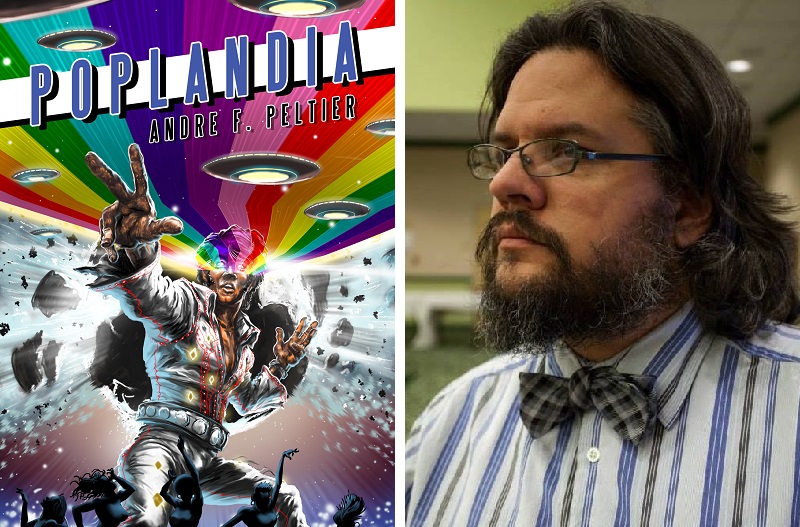
Part tribute, part humor, and part elegy, the new chapbook Poplandia by Andre F. Peltier centers on epic moments, including epic scenes in movies like the "Yub Nub" Ewok celebration to epic memories like recalling the purchase of a new record when it was released. The poet lives partially in this world and partially in others by reviving late 20th century childhood longings, such as to live in the Star Wars galaxy, among others.
One such dream deals directly with poetry itself:
Intro to Poetry anthology.
Dial up a poem on
poetry.org.
Go to open mic poetry nights
or listen to slams in coffee houses.
Find a poem
that won’t be improved by adding
Godzilla…
It can’t be done.
In Peltier’s perspective, life, literature, films, shows, and music should be interchangeable and allow humans and characters to cross boundaries between worlds or break through the fourth wall.
Searching for the Right Words: Julia Cho's award-winning "The Language Archive" makes its Michigan debut at Theatre Nova
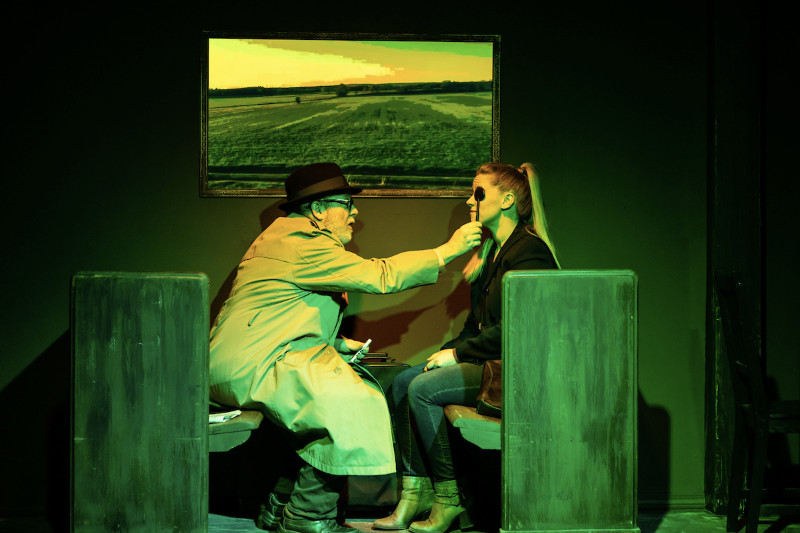
When Julia Cho read about dying languages, she wondered if losing a language meant something larger—losing a whole way of looking at the world.
In her whimsical play The Language Archive, Cho explores the questions: Do languages that develop between people in a country (or a marriage) die when the participants die? Does the culture die when the language does?
First produced in 2009 at The South Coast Repertory Theater in Costa Mesa, California, and then in 2010 at the Roundabout Theatre Company in New York City, The Language Archive makes its Michigan debut at Ann Arbor's Theatre Nova, February 3-26, directed by Carla Milarch. (The play won the 2010 Susan Smith Blackburn Prize, awarded to a new English-language play by a woman.)
“There are sixty-nine hundred languages in the world. More than half are expected to die within the next century,” says George, a linguist and the play’s protagonist. In addition to his native English, George speaks eight languages including Greek, Cantonese, Esperanto, and Elloway—the last of which is a dying fictional tongue.
The Ark’s Ann Arbor Folk Festival Makes Welcome Return to U-M’s Hill Auditorium

After three years away, it felt heartwarming to attend the 46th annual Ann Arbor Folk Festival on January 28.
As a regular past attendee, there was something special about going in-person again to celebrate The Ark’s largest concert and fundraiser of the year.
For once, the entire show occurred before a live audience without any COVID-19 cancellations (aka 2022) or virtual alternatives (aka 2021). (January 27’s sold-out Friday Night Folk: BanjoFest also featured in-person performances with Valerie June, Thao, Yasmin Williams, and Michigan’s Rachael Davis at The Ark’s Ford Listening Room.)
A renewed sense of gratitude filled the air as a lineup of emerging and established folk acts—including Ani DiFranco, St. Paul & The Broken Bones, and Patty Griffin—took the stage at the University of Michigan’s Hill Auditorium for five hours of folk-inspired and folk-adjacent music.
Alongside co-emcees SistaStrings, singer-songwriter Peter Mulvey uttered the words everyone had waited to hear since 2020: “Omigod, we’re finally back!”
Chicago percussionist Kahil El’Zabar brings spiritual energy to Encore Theatre’s "American Songbook" concerts
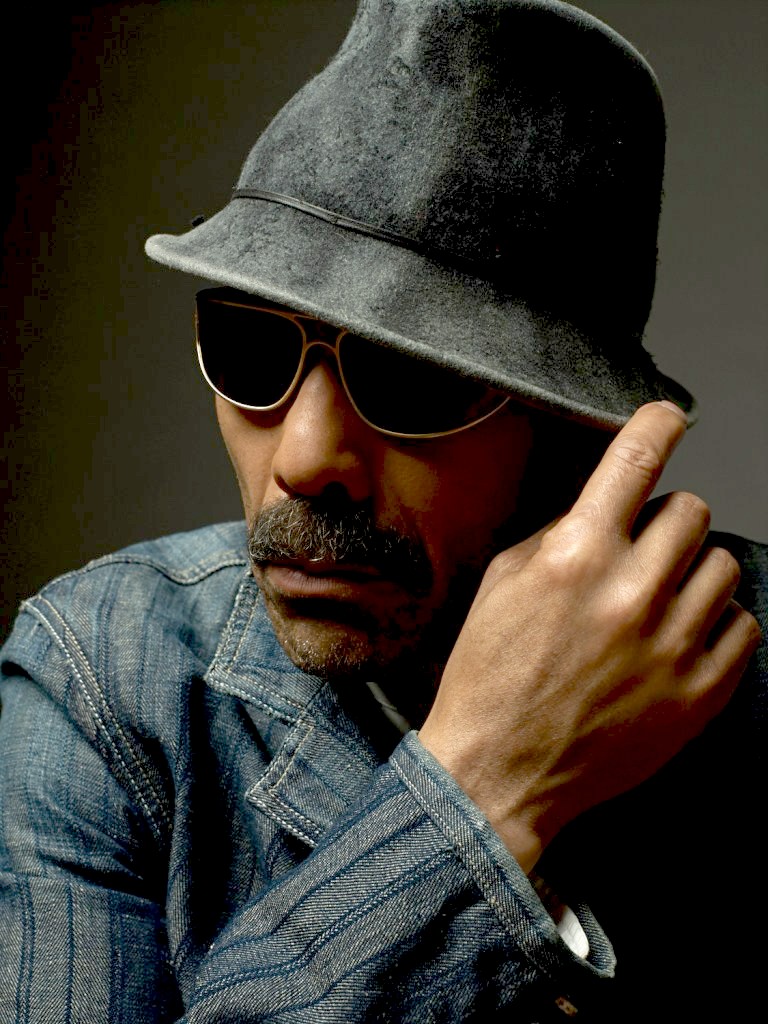
Kahil El’Zabar has a very clear memory of the greatest performance he ever attended.
“I saw [John] Coltrane at a club called McKee’s in Chicago,” the jazz percussionist and band leader said in a phone interview. “I was 15 and [drummer] Elvin Jones went to sleep while he was playing and never lost a beat. The telepathy, the power of communication and connectivity, of mind and spirit in music, that one moment changed my life because I knew that I would want to be part of that embrace for the rest of my life. I would always search for that moment when you are beyond consciousness and can express something greater than yourself. I hope for that every time. When you do it, it is the most exciting and humbling experience you ever experience.”
El’Zabar and his Ethnic Heritage Ensemble will bring his unique approach to the Encore Musical Theatre in Dexter, Feb. 3-4. Last year at about the same time, El’Zabar and his group performed at Encore’s Modern Jazz Meets Musical Theatre; this year the theme is A Modern Exploration of the American Songbook.
The innovative, award-winning musician will celebrate his 70th birthday and the 50th anniversary of the Ethnic Heritage Ensemble next year. His career has been influenced by both his African heritage and growing up in one of America’s legendary jazz cities, Chicago.
El’Zabar’s music has a rich spiritual component that comes from both his experience in Africa and his exposure to the masters of jazz.
“When I came out of Lake Forest College in ‘73, I had an eight-month residency in Ghana,” he said. “I was at the University of Ghana in a city called Legon. Just how people related on a human level, the connection of touch, not just physical but eye and voice and through performance; it seemed to have this spirit that I wanted to retain in my own music.”
As a teenager in Chicago, he got to know performers like Pharoah Sanders, Coltrane, and the Art Ensemble of Chicago. He admired the energy.
Friday Five: GVMMY, Subcortical, Sean Curtis Patrick, Same Eyes, Asilee Sound Group

Friday Five highlights music by Washtenaw County-associated artists and labels.
This week features forward-looking hip-hop by GVMMY, industrial hip-hop by Subcortical, soundscapes by Sean Curtis Patrick, synth-pop by Same Eyes, and chiptunes by Asilee Sound Group.
Open the Vaults: Tania El Khoury's multimedia installation “Cultural Exchange Rate” immerses you in the artist's family history

If you could unearth all the secrets of your family’s past, would you?
Lebanese artist Tania El Khoury set out to do that with her interactive art installation Cultural Exchange Rate, which is presented at the Stamps Gallery, courtesy of UMS, until January 29. The multimedia work tells the artist's mission to trace her family’s roots by having gallery-goers open locked boxes and stick their heads inside to see videos, sounds, objects, and images of El Khoury's family journies between continents.
Originally from Akkar, a small village in Lebanon located near the river that separates Lebanon and Syria, El Khoury’s great-grandparents migrated to Mexico during a civil war. Her grandfather was born in Mexico, but her family eventually moved back to Lebanon, where he collected old coins and Lebanese liras, hoping they would be worth more than their original value one day when the currency exchange rate changed.
The story progresses to the present, with the artist becoming pregnant. In hopes of giving her unborn daughter citizenship in a country with a better passport and more cultural freedom, El Khoury searches for her grandfather’s birth certificate in Mexico, so her daughter can gain Mexican citizenship. The journey is frustrating, and while she hits a lot of dead ends, she also discovers family members in Mexico City that she didn’t know she had. Her story is one of blended cultures, resilience, survival, and hope.
Aaron Burch's perspective-shifting “Year of the Buffalo” tells the tale of a road trip to reconciliation
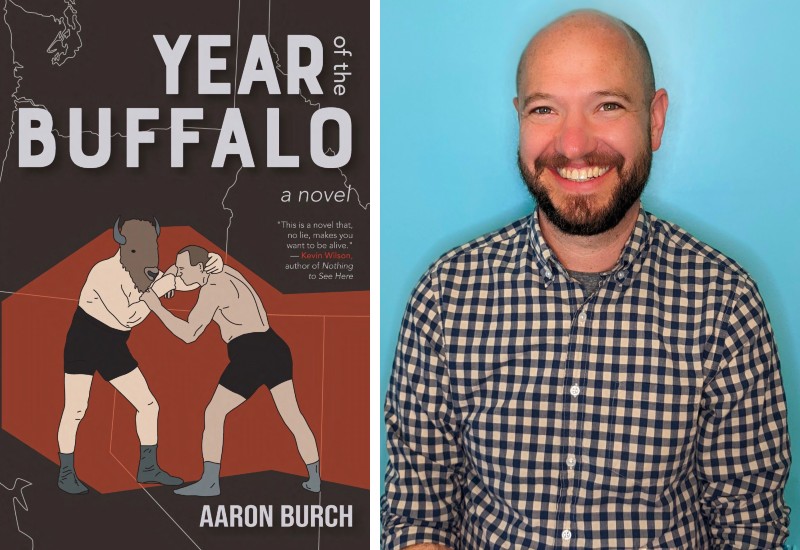
Aaron Burch captures the spirit of a road trip in his novel, Year of the Buffalo. The long drive sets the stage for bonding, observations, and memories shared between brothers Ernie and Scott as they travel from Washington state toward Detroit.
In this third-person novel, the focus shifts from character to character. On the road, Ernie reflects:
They were doing it. He’d agreed to the trip not because of any desire to return to Michigan but just because. Because he had no reason not to, because it seemed like Scott wanted him to go, because why not? But wasn’t this what roadtrips were supposed to be? Revelatory and epiphanic and life-changing and life-answering and everything else about life that he was searching for, everything he thought the farm might be able to be and now believing a cross country roadtrip was definitely going to be. There was a simplicity to the moment—two guys driving, taking their time, without consequence.
Travel by car—or SUV for Ernie and Scott—may be all those things, but the journey also emphasizes the tension and strong need for reconciliation between the two siblings.
The road trip takes on a life if its own as the two men discover secrets about each other. Scott, once a professional wrestler, grapples with the distinction between his persona and self, as does Ernie. The wrestling persona of Mr. Bison must come to life again since the brothers are on their way to promote Scott’s new video game. One of their many interactions reveals the pressure that comes from its reappearance:
"Are we not drawn onward to new erA" Encourages Understanding the Climate Crisis From an Unconventional Perspective

A few people quietly left the UMS presentation of Are we not drawn onward to new erA mid-performance while many others stayed and took part in a spirited standing ovation.
Conceived and performed by Belgian theater collective Ontroerend Goed, it’s just one of those shows: an experimental, challenging piece of theatrical performance art that you either embrace or reject.
And your reaction likely depended on your capacity for patience and ambiguity, which was initially tested when deciding whether or not to purchase a ticket for the January 20 or January 21 performance.
By way of a vague show description, the UMS site reads, “You can’t put toothpaste back in the tube. You can’t remake a shattered vase. Or undo the damage that humans have inflicted on the Earth. But what if you could—in just one night?” (When asking my husband if he wanted to accompany me to the show, he asked, “What is it about?” “Uh … repair, I guess?” He didn’t come.)
Author and Former Literati Bookseller Mairead Small Staid Narrates Travels in Italy and the Search for Happiness in Her Book of Essays, “The Traces”
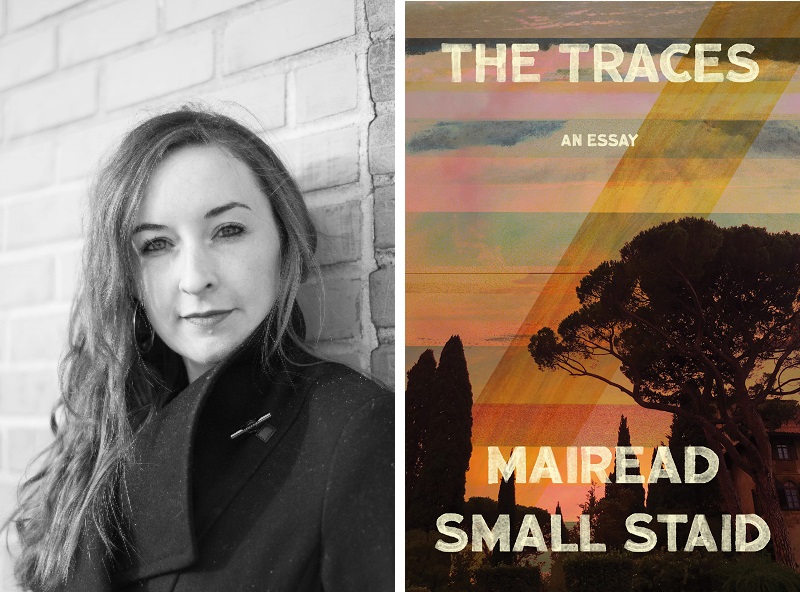
Happiness may be elusive, but the quest is part of the experience.
“Happiness is the endpoint and the race itself, the finished vessel and its firing,” writes Mairead Small Staid, an author, librarian, a University of Michigan alum, and former Literati bookseller.
Her new nonfiction book, The Traces: An Essay, recounts the author’s time in Italy, studies the concept and feeling of happiness, and critiques art and literature. Staid’s chapters form individual essays that roam through concepts such as whether a person is different when in different places and look at sculptures and paintings by artists such as Michelangelo and Leonardo da Vinci. Italo Calvino’s novel, Invisible Cities, is a focal point to which the book repeatedly circles back.
The exploration itself brings novelty and thus pleasure. Staid writes that, “Here lies another possible explanation for my happiness, this sustained and sustaining newness: it’s November, after all, and still each ordinary day—each breakfast, each cigarette—is tinged with cinematic light.” The fresh sights and circumstances can reinvigorate one’s outlook.


































